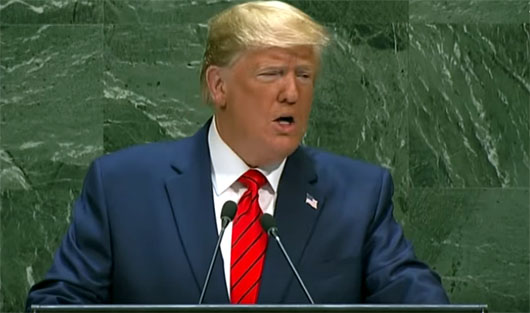Special to WorldTribune.com
UNITED NATIONS — In the wake of Iranian initiated missile/drone attacks which significantly crippled the Saudi Arabian petroleum industry and threatened to bring the Persian Gulf region closer to the brink of a military confrontation, the Trump Administration and its allies have pursued a tough but decidedly restrained policy of deterrence rather than saber-rattling.

The expected incendiary rhetoric towards the Islamic Republic’s aggressive actions was tempered by diplomatic moves to deescalate a brewing confrontation.
President Donald Trump’s address before the United Nations General Assembly offered a measured and almost subdued view of global gains and dangers focusing on credible dangers facing the Middle East in Iran and Syria. One the one hand he praised closer cooperation with Arab allies, “The UAE, Saudi Arabia, and Qatar have pledged billions of dollars to aid the people of Syria and Yemen. And they are pursuing multiple avenues to ending Yemen’s horrible, horrific civil war.”
“The United States is working with the Gulf Cooperation Council, Jordan, and Egypt to establish a regional strategic alliance so that Middle Eastern nations can advance prosperity, stability, and security across their home region,” Trump added.
Yet concerning Iran he advised, “Iran’s leaders sow chaos, death, and destruction. They do not respect their neighbors or borders, or the sovereign rights of nations.”
President Trump advised, “The United States has launched a campaign of economic pressure to deny the regime the funds it needs to advance its bloody agenda. Last month, we began re-imposing hard-hitting nuclear sanctions that had been lifted under the Iran deal… And we’re working with countries that import Iranian crude oil to cut their purchases substantially.”
“We cannot allow the world’s leading sponsor of terrorism to possess the planet’s most dangerous weapons,” he implored.
Central to the debate over the missile/drone attack on Saudi oil terminals was the issue of the proverbial smoking gun. Some sources claimed Yemen’s Iranian-backed Houthi rebels carried out the technically sophisticated attack. Evidence points to the drone barrage coming from the Islamic Republic itself.
Significantly, a joint statement by the heads of state and government of France, Germany and the United Kingdom implored; “We condemn in the strongest terms the attacks on oil facilities on Saudi territory,” and reaffirm, “It is clear to us that Iran bears responsibility for this attack. There is no other plausible explanation. These attacks may have been against Saudi Arabia but they concern all countries and increase the risk of a major conflict.”
The European group added, “The attacks also highlight the necessity of de-escalation in the region through sustained diplomatic efforts and engagement with all parties.”
Speaking at the UN, Secretary of State Mike Pompeo stressed that the U.S. wants “a peaceful resolution with the Islamic Republic of Iran…In the end, it’ll be up to the Iranians to make that decision.”
German Foreign Minister Heiko Maas advised the Assembly, “The attacks on two oil facilities in Saudi Arabia have shown us how fast things can escalate. Iran bears the responsibility, as we Europeans have made clear. The only way towards an easing of tension is talks between the United States and Iran.”
Iran’s President Hassan Rouhani rejected any negotiations with the USA while sanctions remain in force.
There’s equally the important role of Japan, a close American ally and friend, who can come into play in this complex process. Japan’s Prime Minister Shinzo Abe holds a close personal friendship with Donald Trump but interestingly also has a backchannel to the Tehran leadership. Since 2013 Prime Minister Abe has had nine summits with Iran’s President Rouhani. At their recent meeting Abe and his Iranian counterpart had “a frank exchange of views” towards “easing tensions and stabilizing the situation in the Middle East.”
Later at a press conference Shinzo Abe also recounted his meeting with President Trump and added that Japan and the U.S. are working closely together on key international issues. Could Japan serve as a go between for possible USA/Iran dialogue?
Iran’s Rouhani warned that given high tensions in the Persian Gulf region that a “single blunder” could “fuel a big fire.” Tragically this is true; the role of mistakes and miscalculations which could trigger a war are clearly part of the lethal imponderables.
Despite the current General Assembly debate exhibiting less obvious drama, there was nonetheless, more entrenched disillusion. The European Union’s Foreign Policy representative Federica Mogherini may have described it best after an exhausting meeting on Iran, “I hope that rationality will prevail.” Peace hinges on it.
John J. Metzler is a United Nations correspondent covering diplomatic and defense issues. He is the author of Divided Dynamism the Diplomacy of Separated Nations: Germany, Korea, China (2014). [See pre-2011 Archives]

 By
By